Neem Oil For Garden Control
What is Neem Oil?
The benefits of using neem oil for plants are that it’s free of toxins and is highly effective at controlling pests.
Spraying neem oil on leaves helps to reduce foliar fungal infections to prevent your plants…
…from looking dirtyand unattractive. Use neem oil to spray plants. Well using neem oil for garden control…
….is a good way to do! When compared to synthetic pesticides neem oil is a safer alternative.
Most synthetic pesticides contain potentially harmful chemicals that can harm the environment.
Synthetic insecticides may not only kill pests but they can also destroy beneficial insects such as beetles.
Many synthetic pesticides also contain toxins that kill beneficial insects as well.
In addition to providing detailed instructions on how to properly use neem on plants…
…..this helpful article also includes neem oil recipes that are easy to make at home.
Here we have story from Jacob about his experience using neem oil for his garden.
Let us hear Jacob story
I’m always on the lookout for new, natural ways to help my garden flourish.
I must have read about neem oil somewhere online because I found myself ordering some not too long ago…
….and now that it has arrived in the mail, I can’t wait to try it out!
Now this is a product that comes with all sorts of benefits so let me tell you all about them.
For one thing, neem oil actually kills harmful insects like aphids which are a major problem right now…
.…they seem to be everywhere! Beyond killing aphids though, there’s also evidence that neem oil works…
.…as an herbicide so if you’re looking for something organic but still effective against weeds then this might be your best bet.
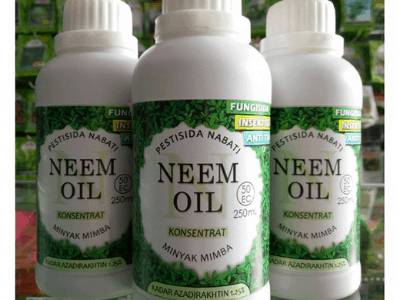
Neem oil comes from the tree Azadirachta indica, a South Asian and Indian plant common as an ornamental shade tree. It has many traditional uses in addition to its insecticidal propeties. For centuries, the seeds have been used in wax, oil and soap preparations. It is currently an ingredient in many organic cosmetic products too.
Heather Rhoades, author from gardeningknowhow.com
Here’s the main thing!
Using Neem Oil For Garden Control
Azadirachtin is the active ingredient in neem oil and is used both as an insect repellent and as a plant chemical…
…for controlling mosquitoes. Neem oil also reduces insect feeding and interferes with insect hormones…
…and reproduction cycle. Originally from India, neem trees produce oil from the fruit of the tree.
These small drupes resemble olives and grow up to 1.1” (3 cm) long. In addition to keeping insects away from plants…
…the oil is also used in traditional medicine.
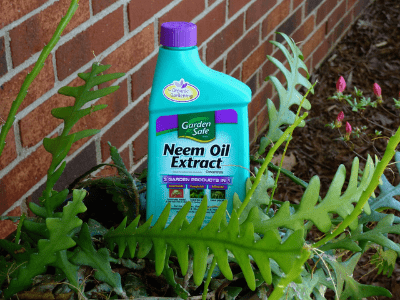
Neem Oil for Plants
It works as a pesticide and fungicide on houseplants and gardening plants.
Neem oil spray solutions prevent mosquitoes, fungus gnats, mealybugs, tomato hornworms, and Japanese beetles.
Fungal diseases such as powdery mildew, leaf spot, tip blight, and scab are destroyed by the fungicidal properties of neem oil.
Neem oil isn’t suitable for all plants. For example, foliar sprays of neem oil can burn the leaves of some plants.
After repotting, some plants can be stressed and you shouldn’t use neem oil to treat them.
Plants such as fruit trees, ornamental houseplants, vegetables, herbs, and nuts can all benefit from neem oil.
You can spray the oil on plants such as these: fruit trees, ornamental houseplants, vegetables, herbs, and nuts.
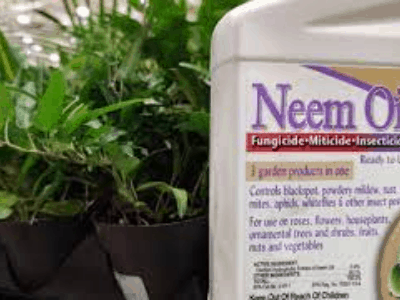
How to Apply Neem Oil as a Soil Drench
Neem oil also works well as a soil drench. Soaking the soil in neem oil solution kills fungus gnats, treats soil fungus…
….and destroys insect eggs and larvae in the soil. The only thing you need to do to rid your plants of pest infestations…
…is to water them with a mixture of neem oil and water them every seven days. If you want to prevent houseplant….
….bugs, drench the soil with neem oil every three weeks. Neem oil is versatile enough to be used as a soil drench…
….and as a foliar spray for plants.
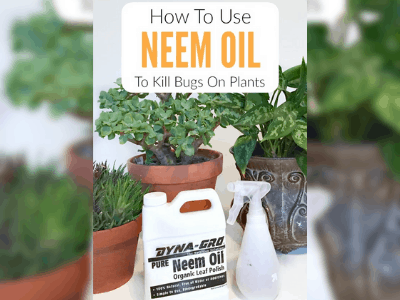
How Neem Oil Works as a Pesticide
This natural compound interferes with the lifecycle of many insects, pests, bugs, mites, and parasites.
Neem oil contains natural insecticides and repellents called azadirachtin. Insects’ feeding and reproduction…
…is disrupted by neem oil, which reduces and eventually eliminates pesky houseplant bugs.
A 2016 study reported that neem oil has over 100 active compounds, many of which have an insecticidal effect.
Researchers found that azadirachtin inhibits feeding that eventually leads to weakness and death.
Neem oil also stops pests from reproducing and weakens winged insects, so they have difficulty flying.
In a different study in Scientific Reports, neem oil was found to suppress growth…
….and cause pest mortality in many types of insects. Insects and pests are controlled by neem oil in the following ways:
- Neem oil disrupts the laying of eggs
- Neem oil prevents larvae development
- Neem oil deters feeding on plant foliage
- Neem oil repels insects and larvae
- Neem oil is poisonous to insects in all stages of growth
- Neem oil inhibits the ability to swallow
Neem oil contains anti-insect properties that do not kill beneficial insects.
So, you can safely use it in your house or garden without worrying about killing bees, butterflies, or ladybugs.
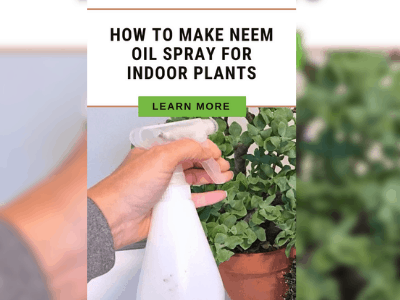
What Bugs Does Neem Oil Kill?
Using neem oil on leaves helps kill insects that feed on the leaves, and spraying with aphids, mealybugs, and whiteflies eliminates them.
Neem oil is also effective against insects resistant to synthetic chemical pesticides because it contains…
….the natural insecticide azadirachtin. Only very few kinds of plant pest are resistant to neem oil.
Several studies have shown that the oil is suitable for natural pest control on many levels.
The most important way neem oil kills insects is by hindering the larval stage.
It also repels insects and prevents them from feeding.
The following 200 pest species are effectively killed by neem oil:
- Aphids
- Whiteflies
- Scale insects
- Thrips
- Fruit flies
- Colorado potato beetles
- Fleas
- Mosquitos
- Japanese beetles
- Various types of caterpillars
- Fire ants
- Weevils
Is Neem Oil Safe?
This natural pesticide is non-toxic and can be applied safely in the home and garden.
It has not been shown to harm humans. When used properly, neem oil is safe to use in organic…
….and traditional gardening as the active pesticide compounds are not harmful to birds, bees, fish, or other wildlife.
However, there is no evidence that neem oil or azadirachtin causes cancer or worsens other serious health conditions.
According to the National Pesticide Information Center (NPIC), neem oil can cause skin irritation.
Neem Oil Spray
Making an easy neem oil spray with some warm water and liquid Castile soap is a great way to keep insects…
….and flies away from your plants. Or, you can buy commercial neem oil spray.
However, making your own spray is usually better.
You can make a DIY neem oil spray for a number of reasons rather than buying a commercial spray:
- You can adjust the levels of azadirachtin to boost the potency of neem oil sprays.
- Neem oil commercial sprays are not always available.
- Homemade neem oil sprays are more cost-effective than ready-made ones.
How to Make Neem Oil Spray
You’ll need neem oil, Castile soap, and warm water to make the spray. Mix two tablespoons of neem oil…
…and one tablespoon liquid soap with a quart of warm water in a spray bottle.
Shake vigorously to combine the ingredients. The addition of liquid Castile soap to this neem oil spray recipe…
….helps bind or emulsify water with neem oil. Shake thoroughly to mix ingredients before using the spray.
How to Use a Neem Oil Spray on Plants
In case of infestations, spray crops weekly with neem oil. You should spray foliage three to four times a year…
…for preventative pest control. Neem oil disrupts pests’ lifecycles, so plants must be sprayed regularly to eliminate bugs.
These tips can help you spray plants with neem oil:
- Before treating the entire plant, test a small section of the plant’s leaves with neem oil because some plants can be burned by the oil.
- Coat the foliage thoroughly with insecticide to prevent fungal diseases and insects.
- Plants shouldn’t be sprayed with Neem oil in direct sunlight.
- Plants should be sprayed in the evening or early morning when the sun isn’t so intense.
- Plants suffering from overwatering or underwatering should not be treated with neem oil.
Neem Oil Spray, Precautions
The natural biopesticide neem oil is generally safe for use around the house and garden.
We caution you to avoid ingesting the oil or smelling it; it’s best to wear protective gloves and goggles.
Neem oil can be used only on almost all houseplants and landscaping plants.
But you should test a small area of foliage first. Neem oil sprays can damage some plant leaves.
So, after spraying a few leaves, wait 24 hours before checking for leaf burn.
Using Neem Oil on Houseplants
Neem oil sprays are an excellent non-toxic way to get rid of houseplant pests. Sassy plants have fewer scale bugs…
…mealybugs, thrips, and aphids when treated with neem oil.
If you suspect mold in the soil or fungus gnats, you can spray the potting mix with neem oil solution.
Using Neem Oil on Garden Plants
Use neem oil to treat ornamental plants as a foliar spray. Use 2 teaspoons of neem oil per quart (liter) of water.
Do not use the solution as a soil conditioner. Neem oil liquid can be added to a large spray bottle.
Liberally apply this liquid to plant foliage to eliminate whiteflies, caterpillars, aphids, and other garden pests.
How Often to Use Neem Oil on Flowers and Plants?
You can apply neem oil insecticides once or twice a week to kill pests. Just keep in mind that azadirachtin works slowly…
…so you should apply the solution regularly for at least a few weeks to kill insects and their larvae.
Insect infestations can be prevented by using neem oil less often-typically every three weeks.
It is best to use it 2-3 times a month, especially at the end of summer and early fall when houseplant pests…
….are at their peak indoors.
Neem Oil as a Natural Fungicide
The natural properties of Neem oil make it a great choice for treating powdery mildew…
….in addition to other fungal issues, such as leaf spots and scabs.
Spray leaves with Neem Oil Spray weekly until fungus symptoms are gone for good.
In addition to its safety for vegetables and fruits, neem oil is a great fungicide.
The residue on plants will not affect them negatively. However, you should wash all fruits and vegetables before eating them.
Neem Oil to Fight Bacterial Disease on Plants
A dormant spray of neem oil on garden plants helps prevent bacterial diseases such as fire blight…
…which causes leafy plants to die. When applied during the dormant stage, it discourages fire blight.
Neem oil or insecticidal soap can prevent fire blight, say researchers at Utah State University.
Home growers can apply neem oil solution to fruit trees when they bloom.
Neem Oil as a Dormant Spray
The foliar spray made from neem oil and soap can be used to control insect eggs in the dormant season.
Spray leaves that are susceptible to aphids, caterpillars, mites, and scale insects.
The neem oil solution should be sprayed on the tree or plant buds about three or four weeks before they begin to swell.
For some fruit trees, you should wait until the buds begin to swell. Apply enough solution to evenly coat the upper limbs.
Neem Oil for Lawn Grub Control
Neem oil has anti-microbial properties, making it a perfect natural solution for organic lawn care.
It has properties against bugs that destroy lawns. For example, azadirachtin kills Japanese beetles…
…which feed on grass roots and cause lawn damage.
To prevent Japanese beetles, apply neem oil solutions to your lawn every two weeks and after each rainfall.
If you notice bare patches of grass, you can use neem oil soil drenches.
In one study, researchers found that azadirachtin in neem oil effectively suppressed Japanese beetle infestations.
Neem Cakes are Excellent Garden Fertilizers
You can fertilize soil and lawn with neem cakes, which are high in nitrogen and can supply plenty of nutrients.
Neem cakes have the ability to improve soil texture, provide plenty of nutrients, and aerate the soil.
Organic gardening uses neem cakes for amending soil to improve soil quality and eliminate nematodes.
Apply the recommended concentration of neem cakes to the soil.
Apply the neem soil solution to your lawn to fertilize it. Mix one tablespoon neem oil with one gallon of water.
Fill up a spray bottle with the neem soil solution.
Sum Up
When applied to young plant growth, neem oil foliar spray has been shown to be most effective.
In soil, the oil has a half-life of three to 22 days, but in water, it only has a half-life of 45 minutes to four days.
It is almost non-toxic to birds, fish, bees, and wildlife, and tests have shown that it does not cause cancer…
….or other diseases when used. As a result, if used correctly, neem oil is very safe to use. It can be difficult…
…to find healthy, non-toxic pesticides for the garden that actually work.
We all want to protect the climate, our communities, and our food, but the majority of available…
….non-manmade chemicals are ineffective.
With the exception of neem oil. Anything a gardener may like is contained in neem oil insecticide.
Conclusion
Last thing for sure. This plant need to be care carefully, remember all plant need the “love” too.
And using neem oil sounds like a good choice for you to have to take care of your plant!
Alright that’s all for today! Do you have any questions about all of this?
Or do you want to add some method for getting rid mold form houseplant?
Let me know your recommendation from the comment below. Find out more about gardening from us!
I hope you can now take care your plant and it’s growing big and healthy!
Thanks for reading this article! Bye!

